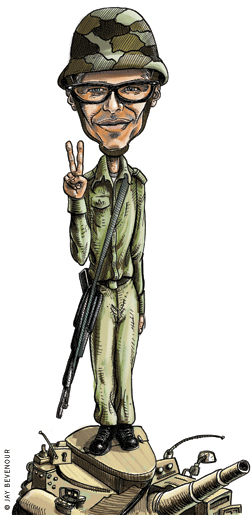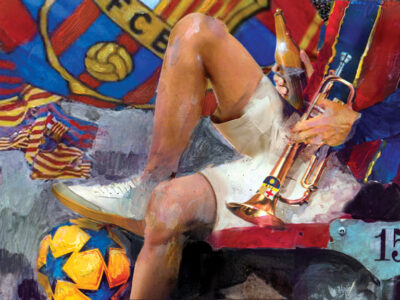
Why would a peace-loving, left-leaning, lactose-intolerant Jew from the Chicago suburbs join the Israeli Army?
By Joel Chasnoff
I am Israeli soldier number 5481287. I’ve been assigned to Platoon Two, Company B, Battalion 71 of the 188th Armored Brigade. I’m at the Armored School, in the south, halfway between Jordan and Egypt. It’s the 30th of July, day one of basic training, and I’m in shock that I’m actually here, in uniform, on a military base, a soldier in a foreign country’s army.
I’m dressed like a soldier but I look like a clown. My uniform’s three sizes too big, and it’s stiff, so it looks like I’m wearing a suit of green construction paper; I’d thought I would look sexy in uniform, but I don’t. I’ve also got a new look—I’m buzz-cut and shaved—and a new name: instead of Joel, I am now my Hebrew name, Yoel, and my last name, according to my dog tags, is Shetznitz.
“You misspelled my name,” I said to the guy at the dog tag machine.
“So don’t die,” he said, and shooed me out the door.
I’m the last guy you’d expect to join an army. For starters, I’m a Jew. And let’s face it, we Jews aren’t known for our military prowess. Jews make movies about war. In the case of Kissinger, we helped escalate a war. But when it comes to actually fighting wars, that’s not our gig. We prefer to leave that to the Gentiles.
Then there’s the issue of my body. I’m five-foot-eight and weigh 130 pounds soaking wet, which I rarely am since I don’t know how to swim. Where manly men have chest hair, all I’ve got are ribs showing through in a way that makes it look like I just barely survived a famine. And as for that big, mean tattoo most U.S. Marines have on their bicep, I could never have that—not just because I’m afraid of needles, but also because it’d be impossible to draw on anything that small.
Psychologically, I’m no more of a warrior. At Penn, I was an actor in Mask and Wig. My svelte figure, high cheekbones, and willowy arms made me an ideal candidate to play any female lead. The comment I heard most often after shows, from old men and sorority sisters alike, was “Nice ass.”
Not exactly military material.
But the main reason you’d never expect me to join an army is that I’m a peacenik. I hate guns. I’ve never been in a fistfight in my life. I grew up listening to Peter, Paul & Mary and Simon & Garfunkel, and I truly believe that, as John Lennon said, we should give peace a chance.
In other words, I don’t hate Arabs.
So why would a peace-loving, left-leaning, lactose-intolerant Jew from the suburbs join the Israeli Army?
I grew up with a strong Jewish identity. Like most of my friends, my family was what’s known as Conservative Jews, which basically meant that we picked and chose which rules to follow and made up others as we went along. Friday nights, we ate Sabbath dinner and refrained from watching television, unless there was a Cubs game on. We ate only kosher food at home, but on vacation we ate pretty much everything except pork. This made being Jewish easy and fun: we simply followed God’s commandments until His laws became a pain in the ass.
From kindergarten through eighth grade, I attended a Jewish day school called Solomon Schechter, where I began learning Hebrew at age five. I was always at the top of my class in Hebrew and Torah studies, and not because I was smarter than my classmates, but because for as far back I can remember, I genuinely loved being a Jew. At school, I volunteered to lead morning prayers as often as I could—so often that my teachers nicknamed me “Little Rabbi.” At the grocery store, I scrutinized the labels on packages of food to make sure every ingredient was kosher. And I couldn’t wait to have a bar mitzvah—not because I was excited for the party, but because it meant I could finally wear the tallis prayer shawl and leather tefillin in synagogue.
When I was six years old, my father’s parents, Zayde Daniel and Bubbie Rose, gave me an illustrated children’s Bible for Hanukkah. I loved my kiddie Bible. Every night, after my parents turned out the lights, I curled up under my blanket with a flashlight to read it. I loved the blood-curdling confrontations with evil Pharaoh, the breathtaking encounters with whales that swallowed men whole. When I read these stories, I imagined I was one of my Bible heroes, marching through the parted Red Sea and turning my staff into a serpent while Pharaoh gasped in fright.
What I loved most about my Bible was that these weren’t just stories, these were my stories. Abraham, Isaac, and Jacob were my ancestors. All these wonderful tales were things that had happened to my family. And where did all the action take place? In a magical, far-off land called Israel. The thought that I might one day visit this wondrous land was, in my mind, like being told I might one day visit Oz.
When I was 17 years old I visited Israel on a six-week teen tour. I’d been to Israel twice before, the first time with my father when I was nine, and again four years later with my parents and rabbi. But it was this third trip, as a teenager, that hooked me for life. Like most 17-year-olds, I was trying to figure out who I was and who my role models were going to be. Within days of arriving in Israel, I discovered my new heroes: Israelis.
They were the coolest, most exciting Jews I’d ever met. Back home, all the Jews I knew were doctors and lawyers, accountants and professors. But Israelis were different. They rode motorcycles. They smoked. The men were muscly hunks with tattoos and the women were gorgeous. It boggled my mind: here were these people with the same roots as us—yet they looked like supermodels, and we looked like Jews.
Most captivating of all were the Israeli soldiers. Here they were, just a year older than me, flying F-16s, carrying Uzis, and strutting around Jerusalem in olive-green uniforms and Ray-Bans. Compared to them, I felt like such a putz: they defended the homeland like Jewish Rambos while I walked around Israel in sunscreen and a fanny pack. All my life, I kept hearing about how Pharaoh had enslaved us, Hitler had killed us, and the Arabs wanted to wipe us off the map. In these Israeli soldiers, I saw a new narrative: Jews who kicked ass.
By the end of that enchanting summer, I’d decided two things. First, that it wasn’t fair that we American Jews called Israel our homeland but left Israelis to defend it. Second, I made up my mind that I, too, would one day be a soldier standing at the side of the road, hitchhiking with an Uzi slung across my back. Instead of just praying for Israel, I would fight for it. I, too, would be the hero of the Jews.
Inside the Israel Defense Forces Processing Center, teams of girl soldiers fingerprinted me, x-rayed my teeth, and cut my hair. I was then handed a paper cup and instructed to fill it. Behind the locked door of a bathroom stall, I unzipped my backpack and pulled out a Coke bottle one-third full with urine. The bottle was warm. I’ve got this strange condition called paruresis, a.k.a. “shy pee,” in which I can’t pee when I’m nervous. I knew the army would ask me to piss into a cup. So instead of taking my chances, I brought pee from home.
As I exited the bathroom stall, someone called, “Hey, bro.” Ambling toward me was a short kid with buzz-cut blond hair, an eyebrow ring, and baggy jeans much too large for his tiny frame. His eyes were bloodshot. He looked like a tripped-out Friedrich von Trapp.
“Smoke grass?” he whispered.
It was like I was right back in Brooklyn. “No thanks.” I said and shook my head, but not too violently—I didn’t want to spill my cupful of piss. I slithered out and started for the door, but the kid pressed his hand into my chest and pinned me to the wall.
“How about it, brother?” he purred. “Can I borrow some piss?”
It wasn’t an issue of quantity—I had
a Dixie cup nearly overflowing with healthy pee. A few drops of my piss could’ve meant one more Israeli soldier and a safer Jewish homeland. But if the girls in the urine lab found out, I’d have been kicked out of the Israeli Army before I was ever in. And what would I do when word of the scandal found its way back to Chicago?
You see, Rabbi, my son was all set to defend the Jewish state when he got caught sharing his pee with a reefer addict…
“Sorry,” I said and bolted past him, my piss sloshing onto my shoes.
Three hours later, I found myself staring up at a leathery-faced officer from the Manpower Division.
“Nu?” he barked. “Have you decided where you’d like to serve?” he said.
“Paratroopers,” I declared. I’d always dreamed of being a paratrooper, just like my idol, Yoni Netanyahu, the leader of the infamous Raid on Entebbe in July 1976, where a crack squad of Israeli soldiers rescued hijacked airline passengers in Uganda. After Yoni died in the raid, his letters were collected into a book called Self-Portrait of a Hero. In high school, I read Yoni’s book twice a year.
The officer opened a manila file folder and immediately snapped it shut. “Paratroopers is full. How about Tanks?”
I cleared my throat. My Israeli girlfriend, Dorit, had warned me that part of being an Israeli soldier was knowing how to stand up for myself. “With all due respect, sir,” I said, “I came from America to be a paratrooper. I refuse to leave this office until you grant my request.”
“You can go to Tanks, or you can go to jail,” he said.
“How about Tanks?” I said.
Which is why I’m now standing in Bedroom 3, Bunk 6 at the Armored School. The room is small, the size of a dorm room. Five rickety bunk beds stand pushed against the freshly whitewashed walls in the shape of a U. Above the door there’s an air-conditioning unit—one of the perks of the Armored Corps. (“Join Armored!” an Armored sergeant barked at the Induction Center. “You’ll get air-conditioning in your room!”) Scotch-taped to the doorway is a six-inch plastic mezuzah—the tiny case containing a piece of Torah parchment on the doorposts of Jewish homes and, apparently, army bunkers.
My platoon is one of three assigned to Company B of the 188th Armored Brigade, the unit responsible for defending Israel’s north, including the Golan Heights and the Syrian border. Three other Armored brigades protect the Galilee and Israel’s center and south. All told, about one thousand eighteen-year-old Israeli boys will arrive at the Armored School today for two months of basic training, followed by two months of Tank School, three months of advanced warfare training, and then a tour of duty in Gaza, the West Bank, or Lebanon.
As I watch my new platoon mates yelp and bounce off the walls like wild monkeys, I get the sick feeling that this is all a big mistake. I always wanted to be a cool, gun-toting Israeli soldier. But now that I’ve done it, it’s obvious I have no business being here. I look at their faces, which are so foreign, and I wonder if I will ever know them. I have this sinking feeling I will spend this year as the outsider of the platoon, alone, constantly reminding people of my name. If I wanted to support Israel, I should’ve mailed a check to the Jewish Federation like everyone else.
I pace the open-air courtyard in the middle of the two-story concrete bunker and try my best to look like I belong. As I wander back and forth, I notice two posters on the wall by the pay phone. The first poster says, in big Hebrew letters
KNOW YOUR ENEMY: HAMAS
Below the headline is a photo of masked Hamas gunmen, rifles raised high in the air. Some of the gunmen hold children dressed in black headbands with red tubes taped to their chests, like kiddie suicide bombers. Together, fathers and sons burn an Israeli flag.
I’ve seen this kind of scary photo before—usually in ads for pro-Israel organizations that try to raise money by scaring the bejesus out of American Jews. In the past, I dismissed photos like this as propaganda. But today, I have a different thought:
Holy shit—these people want to kill me.
The second poster is titled
KNOW YOUR ENEMY: HEZBOLLAH
I lean in for a closer look. The poster is a crude, hand-drawn sketch of a Lebanese hillside. In the picture, three Hezbollah guerrillas set booby traps under a full moon. The guerrillas have dark skin and beards. They wear sneakers, white T-shirts, and jeans. One guerrilla stuffs dynamite into a fake rock. A few yards away, his buddy covers a land mine with a branch. The third guy holds a remote control device that, I suppose, will blow up the explosives in the rock.
I peer at the three guerrillas. In their sneakers and jeans, they look more like high school riffraff than enemies of the Jewish state. I try to imagine what it’s like in that nightmare called Lebanon, where monsters in T-shirts and jeans set booby traps by the light of the moon. Suddenly, I’m overcome with a fresh wave of fear. It hits me that my stint in the Israeli Army isn’t just some crazy adventure. It’s real.
Joel Chasnoff C’96 is a stand-up comedian and writer in New York. Visit him at www.joelchasnoff.com. This essay is adapted from The 188th Crybaby Brigade by Joel Chasnoff. Copyright ©2010 by Joel Chasnoff. Reprinted by permission of Free Press, a Division of Simon & Schuster, Inc.




